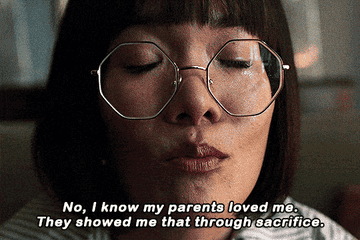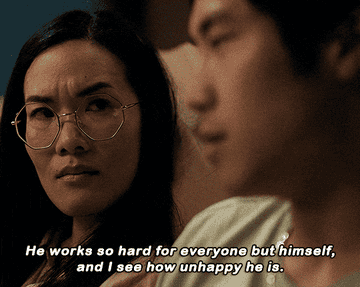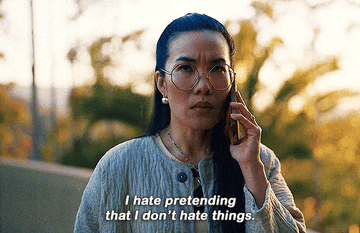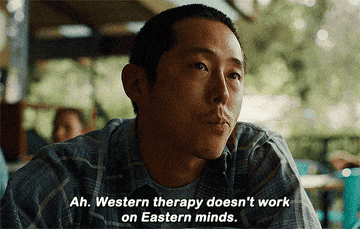" It ’s great to see more Asian actors onscreen and being our mussy , bright selves . The first few episodes were hard to watch because Danny ’s aliveness is kind of bleak — it hit too close to home . "
Note : This post contains discussions of sexual rape .
Unless you’ve been run off the road and stranded on a Malibu cliffside, you’ve likely watched all 10 episodes of A24’s latest series,Beef. Earlier this month, Netflix dropped the Asian-led series, starringSteven YeunandAli Wong, and it’s been generating a lot of buzz on the internet — fromrave reviewsand discourse around the Asian Americanidentityto castingcontroversy.
Though we’ve seen a much-needed influx of Asian actors and stories in Hollywood,Beefhas stood out as a series that portrays characters who just sohappento be Asian American — something alsostressed byseries creator Lee Sung Jin. While that may seem like a hair-splitting nuance, it’s a quite profound one given the history of East Asian representation in Hollywood, ripe with Orientalism and subsequent stereotypes.
That being said, as a mixed Korean American myself, I was curious to know what Asian Americans think ofBeef. So, IaskedAsian members of the BuzzFeed community to share their feelings, and they responded with thoughtful, insightful takes, touching upon everything from representation to the show’s take on anger and generational trauma to the reception of the show:
1.“I loved how the show explored Korean Christians, as well as how relationships shape you as a child and inform your choices growing up. I related to Amy and Danny a lot. I was happy to see a show like this — produced by A24 and created by [Lee Sung Jin] — become a major success on Netflix.”
2.“I am Filipino, and my wife is Vietnamese and Chinese. We very much enjoyedBeefbut had to take pauses from it here and there as it hit closer to home than we originally thought it would — just for the sake of getting in the right mindset. The dynamics between the parents and children and the way that everyone projected what they were taught as children were pretty spot-on and true to human nature. The imprinting from one’s family of origin was very on par with a lot of Asian cultures, too.”
3.“I loved it. It captured so many different experiences that I’ve had as an Asian American growing up in the States. I felt that I could see myself a little bit here and there in multiple characters, from being involved in a predominantly Asian church, like Naomi, to having to pretend to be strong and putting up a front that I’m excelling and okay when I wasn’t, like Amy. I also saw myself in the older sibling role — having to be the more responsible one while also worrying about my younger brother and his dating life — like Danny.”
4.“I loved it. It’s just great to see more Asian actors onscreen in general and being our messy, hopeful selves. I will say the first few episodes were hard to watch because I think Danny’s life is kind of bleak — it hit too close to home. It’s sad, though, that the producers overshadowed their own work by casting David Choe.”
5.“Beefis the first show that I could relate to. I could understand the inside jokes; the Korean church and the nuances of the church-goers; the chicken sandwiches from a specific chain and location; the lies told to family to protect them; the constant questioning and defending ofemotions, and the reactions to the people in our lives; the vulnerability we show to those we hope to never really know. Sometimes, the frustrations played out were too real. I had to pause and laugh or cry because it hit a nerve. Steven and Ali were fucking incredible. The character of Isaac represented the misogynistic Asian asshole who thinks he deserves respect when he’s just a dick. I fucking loved the show.”
6.“I couldn’t make it past 25 minutes. It’s pretty traumatic to relive all of the layers of Asian culture that I hate. Finding identity in the mix of the American ‘melting pot’ has been a life journey. This show unveils what I left behind to move forward — toxic levels of pressure and never being good enough that are perpetuated by family and a church culture that bring constant guilt, riddled with thick layers of misogyny and judgment.”
7.“I loved it. It’s an original story that doesn’t focus so much on Asian-ness, but the characters do things that are so relatable to Asian Americans. I think the idea of being seen is so important to everyone, and this is one of the first times I’ve felt seen and represented. I never knew I was missing it from the media. Now, I’m craving more like it.”
8.“I definitely resonated with the heaviness regarding family obligations and expectations. Growing up, my immigrant parents were very strict, and their restricted perspective of their new environment naturally tainted my growing awareness.”
9.“As an Asian American who’s tried to be an independent thinker, I never gave much thought to on-screen representation growing up. It’s not that I thought it wasn’t important, but Asian representation in Hollywood has always been lacking (I grew up in the ’70s–’80s), so I just accepted it. Now that I’m seeing more Asian representation — especially afterCrazy Rich Asians— it unexpectedly created a sense of ‘Yes, finally!’ in me. I began to feel a sense of pride and comfort because I’m seeing people who look like me on screen more often. My favorite thing aboutBeefis that it’s a story of two human beings who happen to be Asian and how our upbringing affects our behavior today. Yes, there were Asian nuances, but it wasn’t any person’s entire identity. I watched the entire series in one day and before the news came out about David Choe.”
10.“I loved it. I loved the fact that the characters were very complex and their sole personality traits weren’t just being ‘the Asian.’ I also saw some of my own character traits in Amy and Danny, like trying to deal with problems on my own and not asking for help. In the end, both of them seemed like terrible, selfish people who sabotaged their own happiness because they didn’t know how to cope with life. I think this is why it was such an interesting show: Everyone happened to be Asian, but the show actually focused on the humanity of two people just trying to make their way through life in the best way they know how.”
11.“I loved it. It did make me think a lot about what I have been through as a first-generation Asian in America. I found the series to be really sad. I can relate to some things that Danny was going through. As the oldest in an immigrant family, you’re trying to perfect yourself to make your parents proud or show others that you are doing well. It puts a lot of pressure on the individual, just like what Danny experienced.”
12.“Loved it. Everything was fantastic — acting, writing, directing, music, editing. I saw a lot of myself in Danny. I grew up in LA and have definitely let road rage escalate to unhealthy levels. As a Korean American, I also frequently feel the weight of family pride, responsibility, and expectations. I hopeBeefleads to new levels of success and opportunity for everyone involved and for Asian talent in general.”
13.“I’m only a few episodes in, but I do like howBeeftouches upon the different ethnicities within the Asian identity. It’s easy to put Asians in one category, but our histories and cultures have more differences than similarities. I think they could’ve done a better job casting the role of Kayla. The hot white girl trope only reinforces the unconscious bias of whiteness somehow always being better looking or more desirable.”
14.“I was 15 minutes into the pilot when I read about David Choe. I understand the idea of it being reductive to stop supporting an Asian-led show because of one actor, but the idea that on-screen diversity is more important than standing firmly against sexual assault and those who perpetuate and normalize it in real life is even more reductive, in my opinion.”
" More generally , as an East Asiatic , Asian and Pacific Islander histrionics has been reductive in itself as Pacific Islanders , Southeast , South , and West Asian hoi polloi are mostly ignored or manipulate among AAPI medium — so it all feel uncomplete and reduce either way . "
— darjeeling03
15.“It was hilarious and spot on. I grew up inHawaiiwith Japanese national parents, and I was coddled like George, too. There’s a huge difference between Japanese, Chinese, and Korean culture, andBeefgot it right.”
16.“I loved the show! I loved the fact that each character had a wide range of emotions. They did not conform to the stereotypical Asian roles typically seen in shows. Each character had moments of reflection, bursts of anger, and unhappy reactions to things that typically upset people, fully encapsulating the human experience. I also thought it was hilarious that instead of making fun of Asians for having small eyes, Danny referred to white people as having ‘big, bug eyes.’ There were many different subtleties that allowedBeefto break free from the usual mold of Asian movies and shows. I think the generational trauma was accurate, too. Even though they could not possibly capture every Asian experience, there were many dynamic intricacies that still made it relatable to me as a first-gen Asian American — including some of the frustrations I’ve learned and grown from.”
17.“Loved it! I especially appreciated how well-developed the characters are and how the cultural and racial aspect was just one part of who they are. It wasn’t heavy-handed in trying to provide representation. It represents just by showing Asian Americans as fully-formed humans with a wide range of experiences and emotions. The different types of personalities of both the main and supporting characters inherently challenge Asian American stereotypes (such as being smart and studious, like the model minority myth, or being submissive).”
18.“Beefis a superb series in every facet of filmmaking — the actors, the script, the direction, the editing, the photography, etc. I mean, who doesn’t appreciate a smart dark comedy? The fact that it featured Asian Americans who were fleshed-out, three-dimensional characters made me feel seen and laugh at myself — especially as it showed how the cultural backgrounds of the primary characters influenced and informed their actions/reactions. It’s often said that great humor always has a bit of truthfulness.Beefhit the bullseye.”
19.“I likedBeef. It showed how unchecked anger can, universally, be bad and how quickly things can spiral out of control. It’s one of my biggest fears in life. I don’t think it had to be an Asian-majority cast to be representative of the Asian community. Yeah, that generational pressure and responsibilities are tough on us. We have a lot to live up to, and it’s both outside of (from peers to family) and within us. All people go through it — whether they’re Black, white, Latino, etc. Maybe some cultures don’t show it the same, but we all feel it. I also saw a lot of myself and people I know in the characters. I saw myself getting angry in the car. Yeah, there are some things I imagine doing — losing control and taking it to Armageddon — but I stop myself and realize how crazy that is. I also saw myself being hard on my son. I’ve got to stop that. As for the criminals, yeah, we have stupid people and our share of criminals in the Asian community.”
If you or someone you sleep with has experienced intimate ravishment , you’re able to call theNational Sexual Assault Hotlineat 1 - 800 - 656 - promise , which rootle the caller-up to their nearest sexual violation inspection and repair provider . you could also search for your local centerhere .



















